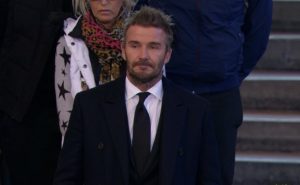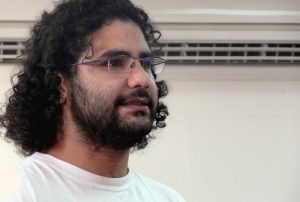London On the same weekend that COP27 ended with the deals criticized in Egypt and the condemnation of green laundering, the World Cup in Qatar kicked off with accusations that sports ethics competed with football for attention and tarnished the reputation of some celebrities, including the former gay icon and current sports vice. David Beckham icon.
The former football player has become the ‘Genie’ of the universe of those who make money to promote the FIFA Cup and the wonders of the oppressive country, turning a blind eye to allegations of ill-treatment of the workers who built the stadiums and sparking outrage. community gay and human rights defenders.
The debate has escalated this week after an opinion article in The Independent by journalist Matthew Todd, former editor of gay magazine Attitude, whose cover with Beckham a few years ago made him an example to watch.
fans forgive
Two major global events in November face the same challenge: they’re designed to take place in countries that have been criticized for human rights abuses and intolerance towards LGBTQIA+ people.
But the criticisms aren’t going anywhere for the folks. Some negative publicity at most in the international media, as leaders have the opportunity to meet with guests, including presidents and prime ministers who openly defend human rights but do not hesitate to take advantage of the hospitality of their hosts.
The relationship between fans and clubs or national teams is not rational. A study published in May in the Journal of Sports Marketing and Sponsorship, authored by researchers Sungkyung Kim and Argyro Elisavet Manoli, showed that for them, a strong bond with a team or national team leads to avoidance of criticism.
They argue that socially responsible actions – or lack thereof – are incapable of influencing passion; they just don’t work. This is why national teams are also forgiven for giving up on wearing rainbow armbands.
Sports wash at Beckham and Qatar
For people like former UK star David Beckham, who is married to former Spice Girl Victoria and is one of the biggest social media celebrities in the world, it’s something else.
The 10-year £15m annual contract with the kingdom includes the ‘ambassador’ and the promotion of the country, not just the sporting event, implying a deeper and lasting relationship.
In this video released two months ago, the former actor takes a tour of Qatar and encourages visitors to get to know the country. In the video released by the tourism agency Visit Qatar, comments have been disabled, perhaps to minimize attacks.
But since Beckham was an athlete and made his ‘debut’ during the World Cup, his association with sports washing was inevitable.
The actor came into the limelight after he was bullied by comedian Joe Lycett, who had 1.3 million followers on Twitter, during England’s first World Cup match.
Days ago, Beckham had promised to trash £10m if he didn’t cancel his contract by the tournament’s opening. If he did, the money would go to charity.
In the middle of the day, shortly before the ball began to roll on the court, TVs and social media broadcast images of supposedly burning money.
Later, Lycett admitted that what came out of the machine was not smashed money and that he would not irresponsibly burn resources that could help others. But he smashed a copy of the famous gay magazine Attitude with Beckham on the cover.
???????? pic.twitter.com/YuPYSQ2M6u
— Joe Lycett (@joelycett) 21 November 2022
The broadcaster endorsed the protest and issued a stern note against the athlete, saying that it could not be “so-called” to defend the rights of gays, as well as women and other groups.
Attitude removed the famous David Beckham cap from his office and criticized the football player for ‘considering corruption’.
In the Independent’s article, Matthew Todd, who took responsibility for helping the athlete become a gay icon, denounced Beckham’s affiliation with Qatar, but defended a wider debate, pointing to the hypocrisy between those who denounced the bad practices and those who associate with those who support them. including attitudes towards climate change.
He mocked: ‘Beckham is a hypocrite. But we all are.”
Have a read of this. I didn’t write the title. I think I would choose the ‘Yes, David Beckham is a hypocrite’ option. But so are we’ https://t.co/lfkPWc3Vu2
– Matthew Todd ???????? (@MrMatthewTodd) 30 November 2022
Beckham “Sir”?
Beckham may not have given up on millions, but he risks losing something money can’t buy: a royal engagement.
At Queen Elizabeth’s funeral, he was applauded for queuing for 13 hours, supposedly anonymously, to bid farewell to the monarch who had betrothed him.
Also read | David Beckham, who spent 13 hours in line, was crowned Queen of England. He gets emotional as he bids farewell to Elizabeth.
According to rumors, he did this with the thought of the future Knight of the British Order. Royal insignia have often been the subject of controversy, as some names have been heavily questioned.
And King Charles faced a storm last year when his chief counsel was involved in allegations that he was exchanging donations for engagements.
Also read | Anti-monarchist group reports Prince Charles to Scotland Yard over donations in appreciation scandal
Buckingham Palace advisers with this background, if they have any sense, will advise the King not to ‘Sir’ David Beckham over accusations that he aided Qatar’s sports wash.
On the eve of the trophy’s inauguration, FIFA president Gianni Infantino delivered a shocking speech, calling nations critical of Qatar hypocritical, seeking to separate the country from the accusation that he used the tournament to improve its image – sports washing.
Pop singer Robbie Williams, who was hired to perform in Qatar, did the same, saying he wouldn’t be able to sing in his own kitchen if he didn’t play in countries that do not respect human rights.
There are those who argue that global events are helping to change countries. There was a fragile debate after the ban on alcohol in stadiums, days before the opening of the World Cup. Or the reaction of the England team, who promised to wear a rainbow armband and gave up.
And news like that of the Brazilian journalist who was questioned by his picture of the Pernambuco flag showing the rainbow.
Considering the situation of prisoners in Egypt, which has not changed with COP27, the thesis that countries have improved is also questionable.
Activist Alaa Abdel Fatah went on a hunger strike and could have died during the summit had the government not force-fed her.
Also read | COP27: Blogger imprisoned in Egypt hardens hunger strike to pressure leaders
The leaders, who said they “raised the issue” in their talks with President Sisi during COP27, left. The United Nations website publishes a harsh manifesto against arrest. However, Abdülfettah is still in prison like other opponents of the regime.
The trend at the World Cup is that Qatar will not suffer the consequences either, apart from minor upsets such as the absence of Prince William (for now).
The heir to the crown, head of the Football Association and regular of the stadiums, has not yet made it to Qatar, but if the English team reaches the final (confidence is high after the first wins), the decision may be revised.
The boycott that both fans and spectators feared did not materialize.
In the UK, some pubs have stopped broadcasting matches to protest the country banning alcoholic beverages in stadiums on the eve of the opening.
But if they’re not bar-goers, does it really matter who’s going to have to watch the games at home and not in the animation of their favorite bar?
Even if the thesis that nations can thrive after major events is applied in practice, companies and celebrities who approach this bonfire are at risk of getting burned.
According to the researchers’ study, clubs and national teams seem more sheltered because of the passion they evoke.
Brands and individuals, on the other hand, may seem advantageous at first glance, but their recruiters may regret the money or visibility resulting from deals tied to sports wash, green wash and many other image wash initiatives.
Also read | Qatar should expand World Cup spectator bathroom over Olympics and Super Bowl
source: Noticias
Mark Jones is a world traveler and journalist for News Rebeat. With a curious mind and a love of adventure, Mark brings a unique perspective to the latest global events and provides in-depth and thought-provoking coverage of the world at large.



